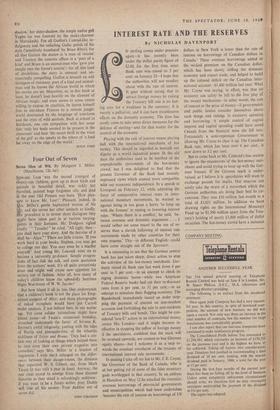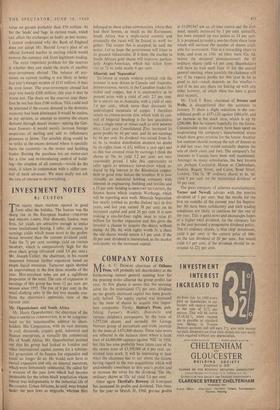INTEREST RATE AND THE RESERVES
By NICHOLAS DAVENPORT Playing with the rate of interest means playing ball with the international merchants of hot money. This should be regarded as beneath our dignity as a world industrial power. In the old days the authorities used to be terrified of the unpredictable movements of the hot-money crowd, but I was delighted to find that the present Governor of the Bank had recently expressed views which seemed more compatible with our economic independence. In a speech at Liverpool on February 12, while admitting the force of comparative interest rates in inter- national monetary movements, he warned us against being in too great a hurry `to keep up with the Joneses' in raising or lowering interest rates. 'Where there is a conflict,' he said, 'be- tween overseas and domestic arguments . . . I would rather see some resort to the use of re- serves than a slavish following of interest rate movements made by other countries for their own reasons.' This—in different English—could have come straight out of the Spectator.
It is interesting to see that the German central bank has just taken sharp, direct action to stop the activities of the hot-money merchants. Ger- many raised its Bank rate last week from 4 per cent. to 5 per cent.—in an attempt to check its raging domestic boom—while two American Federal Reserve banks had cut their re-discount rates from 4 per cent. to 31 per cent.—in an attempt to stimulate their flagging economy. The Bundesbank immediately issued an order stop- ping the payment of interest on non-resident accounts and forbidding the sale to non-residents of Treasury bills and bonds. This might be con- sidered `non-U' action in an international money centre like London—and it might become in- effective in stopping the inflow of foreign money if the speculators, confident that the mark will be revalued upwards, are content to buy German equity shares—but I welcome it as a -step to- wards the eventual overthrow of the tyranny of international interest rate movements. .
In passing I take off my hat to Mr. J. E. Coyne, the Governor of the Bank of Canada, who is at last getting rid of some of the false monetary gods worshipped in that country. In an address in Hamilton on May 12 he attacked the excessive overseas borrowings of provincial governments and municipalities which had been undertaken `because the rate of interest on borrowings of US
dollars in New York is lower than the rate of interest on borrowings of Canadian dollars in Canada.' These overseas borrowings added to the wicked premium on the Canadian dollar, which has been slowly stifling the domestic economy and export trade, and helped to build up the colossal deficit on the Canadian inter- national account—$1,460 million last year. What Mr. Coyne was saying. in effect, was that no economy can safely be left to the free play of the money mechanism—in other words, the rate of interest or the price of money—if governments and public bodies consider themselves above such things and indulge in excessive spending and borrowing. A simple control of capital imports and capital spending could have saved Canada from the financial mess she fell into. Fortunately a semi-repentant Government is allowing Mr. Coyne to clear it up. The Canadian Bank rate, which has been over 6 per cent., is now down to 3.2 per cent.
But to come back to Mr. Cobbold's fine resolve to ignore the manoeuvres of the hot-money mer- chants and avoid trying to keep up with the Ger- man Joneses. If the German mark is under- valued, as I believe it is speculators will want to exchange pounds for marks. Our reserves can surely take the strain of a movement which the German authorities are doing their best to cir- cumvent. They rose £10 million last month to a total of £1,021 million. In addition we have drawing rights on the International Monetary Fund up to $1,500 million apart from the Trea- sury's holding of nearly £1,000 million'of dollar securities. The hot-money crowd have a nuisance
value no greater probably than £50 million. As for the 'leads' and `lags' in current trade, which can affect the exchanges as badly as hot money, cannot understand why the Bank of England does not adapt Mr. Harold Lever's plan of an official forward market in sterling which would remove the currency risk from legitimate trading.
The more important problem for the reserves is whether they can stand the strain of another over-investment abroad The balance of pay- ments on current trading is not likely to better last year's meagre surplus of £145 million; it may be even lower. The over-investment abroad last year was nearly £200 million; this year it may be worse too. The drain on the reserves may there- fore be not less than £100 million. This could well be tolerated if the excess demand in the domestic economy had been eliminated. It would be useless, in my opinion, to attempt to remove the excess demand through dearer money—apeing the Ger- man Joneses—it would merely increase foreign suspicions of sterling and add to inflationary pressures at home. The sensible thing would be to strike at the excess demand where it specially hurts the economy—in the motor and building trades. Raising the purchase tax on motor-cars for a time and re-introducing control of build- ing—the simplest of all controls—would do the trick, if taken in conjunction with a stiffer con- trol of bank advances. We must really not. ask the rate of interest to do everything.











































 Previous page
Previous page